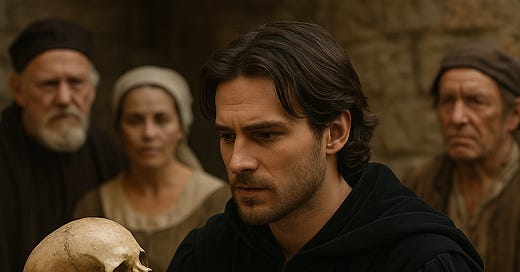Discussion for William Shakespeare's Hamlet, Act III
Reading Dates: April 25, 2025 - May 1, 2025
Recap of Acts I & II
In Act I, Prince Hamlet is introduced in mourning for his father, King Hamlet. He soon learns from his father’s ghost that the new king, Claudius (Hamlet’s uncle), murdered him to seize the throne and marry Queen Gertrude. Hamlet swears revenge but does not act immediately.
In Act II, Hamlet begins to feign madness to uncover Claudius’ guilt, setting the court on edge. Rosencrantz and Guildenstern, two of Hamlet's school friends, are summoned by Claudius to spy on him. Hamlet also hatches a plan to have a troupe of actors perform a play mirroring his father’s murder, hoping to gauge Claudius’ reaction.
Discussion Questions (Post your thoughts below):
In the famous “To be or not to be” soliloquy, Hamlet contemplates the nature of existence. What new light does this speech shed on his inner conflict and the theme of action vs. inaction?
How does Claudius respond to the play-within-the-play? What does his reaction reveal about his character and his guilt?
Hamlet confronts his mother, Gertrude, in a heated and emotionally charged scene. How does this interaction deepen the play’s exploration of family, betrayal, and moral ambiguity?
Polonius hides behind the arras and is killed by Hamlet. How does this act of impulsive violence complicate our view of Hamlet’s moral compass and mission?
Anything else you want to discuss?
Themes and Ideas to Explore:
1. Madness as Mask and Mirror
Hamlet's madness is both a strategy and a mirror of his inner chaos. In Act III, it becomes harder to separate performance from reality, especially in his confrontations with Ophelia and Gertrude. Is Hamlet losing control, or does he remain a calculated performer?
2. Conscience and Guilt
Claudius’ soliloquy after the play reveals the weight of guilt he carries. While he admits to the crime, he cannot truly repent. Shakespeare juxtaposes Claudius’ visible remorse with Hamlet’s indecision, suggesting that guilt alone doesn’t lead to redemption.
3. The Power of Theater
The mousetrap play acts as a turning point, demonstrating the potential of drama to expose truth. Shakespeare uses the play-within-the-play to comment on the function of art as a moral mirror and catalyst for action.
Background and Context:
Elizabethan Beliefs about Revenge and the Soul: Hamlet’s hesitations reflect the Renaissance tension between Christian forgiveness and the older, pagan code of revenge. The fear of eternal damnation plays into his indecision.
The Role of Theater in the Renaissance: Shakespeare stages a play within a play to explore how performance can influence reality. In Elizabethan society, the theater was both entertainment and political commentary—a means of moral reflection.
Family and Authority: The strained relationships between Hamlet, Gertrude, and Claudius parallel broader questions about loyalty to family vs. loyalty to truth. These tensions mirror political uncertainties of the period, particularly anxieties about succession and legitimacy.
Key Passage for Discussion:
“To be, or not to be, that is the question: Whether ‘tis nobler in the mind to suffer The slings and arrows of outrageous fortune, Or to take arms against a sea of troubles, And by opposing end them.”
How does this soliloquy encapsulate the broader philosophical and emotional struggles of the play? Does it move Hamlet closer to a decision, or deeper into paralysis?
Teaser for Next Reading:
In Act IV, Hamlet is sent away to England, and the fallout from Polonius’ death begins to unravel the court. As Ophelia descends into madness and Laertes returns, the cycle of revenge begins to spiral.
Stay Connected!
Reddit: r/greatbooksclub
Substack: Subscribe for emails and podcasts at The Great Books
X (Twitter): Follow and engage at @greatbooksww




